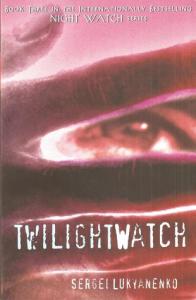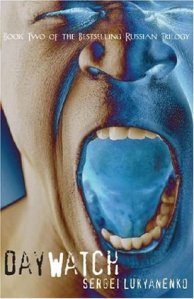Twilight Watch, book 3 of Sergei Lukyanenko’s Watch series. For those unfamiliar, the Watch series is about supernaturals living among us called Others, mainly consisting of vampires and magicians and witches and werewolves, etc., who are either on the light or the dark side. The watches, divided into a day and night watch are, respectively, supernatural police forces who keep watch on its counterpart to maintain order. Supernaturals in disguise, as it were.

Overall, I was very satisfied with this one. Day Watch (#2), not so much. I guess the night watchers are more appealing to me as a reader.
We come back to Anton from Night Watch. He’s dragged back into duty during vacation with the news that an Other is planning on transforming humans into Others via a spell that supposedly doesn’t exist. Well of course it exists, and Anton must find this schemer before he does such a thing and permanently erases the human race. We wouldn’t want a world full of enchanters and werewolves and vampires now would we.
Pros:
- Lukyanenko delves into the morality and politics of being an Other. I must say, any supernatural novel or series is incomplete without this personal question becoming an issue for the character. I was very glad to see this.
- The book was written in three parts. Anton is unsuccessful in part 1. When I began part 2, I was thrown because the setting and characters took a 90 degree turn. But by the third part, parts 1 and 2 are wonderfully woven together. Lukyanenko delivers.
- I still get a kick out of the fact that Lukyanenko’s vampires cannot consume from a drunk. In Russia. Where vodka abounds. Garlic? Vampires scoff. Whiskey? You’re done. Stinks to be a vampire in Russia.
Cons:
- By the time the plot thickened, I had already predicted who the schemer was. The blurb on the back cover gave it away, too. Why would they do that? I wanted to think there would be a twist about the whodunnit, but alas, there was none. This may be a big no-no to some readers, and maybe it’s just because I’m a fan of Lukyanenko, but his story-telling is very entertaining despite the main plot being easy to predict.
- Okay. The lyrics thing is getting dull. I love music, don’t get me wrong, but when I read lyrics to a tune I don’t know, it … falls flat. And the lyrics aren’t even that fantastic. But its his book so he can do what he likes with it. But this is the main reason why I would never put lyrics in a piece of literary work, no matter how brilliant I think the words to a song are.
- Again, lots and lots of dialogue. Like, 80+% of the story was dialogue. But in this book, it didn’t bother me as much, but still rather noticeable.
I’m a nice reader. 8 out of 10, the minus two mainly for the predictability of the story. But he’s laid some serious foundations for the next book in the series so hopefully I can find the next one, The Last Watch, somewhere on half dot com where I buy most of my books. I much prefer a nappy used book than a crispy stiff new one.


